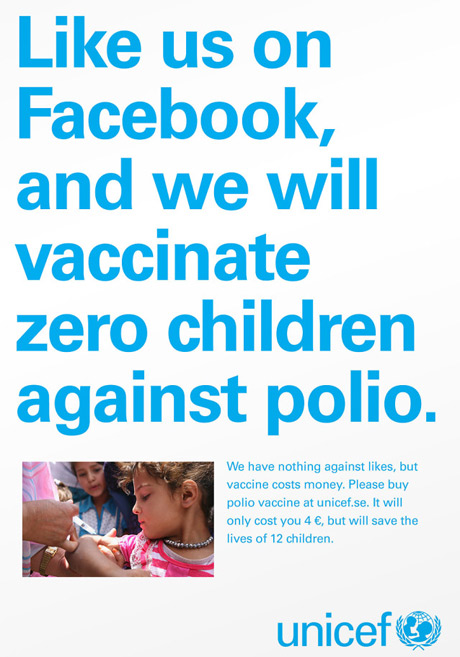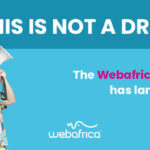When I heard mention of Unicef’s Facebook campaign on the radio a couple of weeks ago, it resonated. What a killer message – literally! It encapsulates perfectly a skepticism for an aspect of social media which I loathe.
This goes beyond my friend Bobby’s boring Facebook insight into his boring life with his insatiable appetite for boring his friends he scarcely knows with his whereabouts and status updates, or his race to re-tweet the character-limited tweet of someone who is a bit more interesting than him. It’s exhausting. But at least he makes an effort to type something every time he does that.
Not so when he ‘likes’ something, is it? Has he really considered whether he likes it or not? Does ‘liking’ it actually mean anything to him, let alone to any of those on the receiving end of his wisdom? Who cares whether he likes Unicef or not? He’s taken the easy route. He’s gone for the improved social standing with his assumed support of a worthy cause, he’s probably gone for the iPad win with his previously-unknown new favorite company, he’s all out for liking stuff because it’s so effortless.
They say that social media takes the fake fluff out of marketing. Not yet, it doesn’t. It might (largely) be written ‘by the people for the people’, but we are a long way from being able to filter that massive wave of opinion which we simply wouldn’t trust if we had more of an opportunity to weigh up the deliverer of the message. Yes, there are some dodgy owner-written reviews on Trip Advisor and the like but there are also many genuine opinions of many people whom, if we met them in a bar face-to-face, we would just think “you’ve been talking rhubarb for the last 15 minutes, I disagree with everything you have said and I would never trust anyone wearing green shoes anyway”. In most online encounters, whether Facebook, Twitter, forums or comments, it’s very hard for us to see that Bobby’s shoes are green.
We’d never disagree with Bobby ‘liking’ Unicef though. Why would we? The question is, do we like Bobby, and do we value his opinion?
Let’s have the debate. Perhaps I just don’t get it and I should be grateful that Bobby has raised awareness for Unicef’s efforts to combat polio because his 252 friends now see a message which they would not have seen without Facebook’s help? Perhaps I should be delighted that Web Africa’s ‘likes’ have gone into double digit thousands? In truth, it has a hollow ring to it, because ‘liking’ Web Africa doesn’t mean we are good at what we do. For anyone to pat themselves on the back for being ‘liked’ is fools’s gold.
What I care about is, hopefully, a more telling measure of our customers’ happiness, which starts with surveying our staff’s happiness every month, and extends through to gauging our customers’ satisfaction level monthly, via a method known as NPS (Net Promoter Score – read more about it here), with the products and services we provide. This way, we can get much closer to knowing whether Bobby really does like us.




